Daria Pyshnenko & Gus Borges Are Following in the Footsteps of their Olympian Parents, Two Decades After They Swam the Same Event in Atlanta
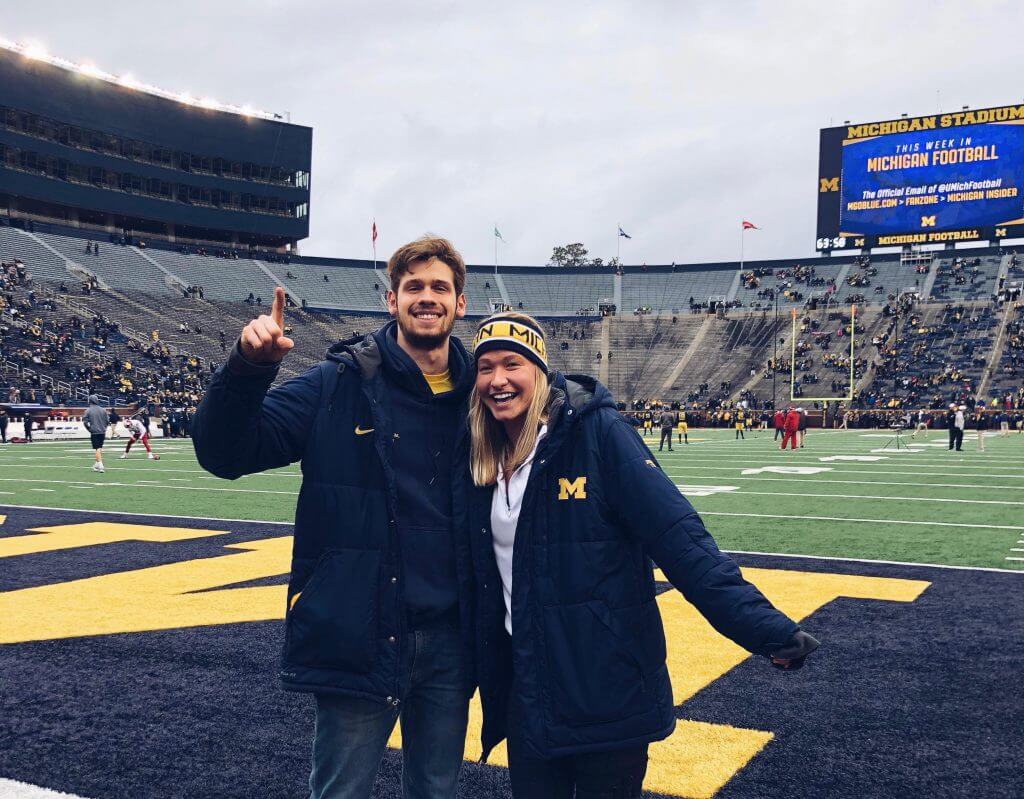
Editorial content for the 2020 NCAA DI Men's Swimming & Diving Championships coverage is sponsored by GMX7 Training.
See full event coverage.
Follow GMX7 Training on Instagram at @gmx7training #gmx7training

Growing up as the child of an Olympic swimmer can be difficult, especially when both of your parents have reached the highest stage in the sport. That has been the case for Michigan juniors Gus Borges and Daria Pyshnenko.
But what is interesting for both Borges and Pyshnenko is that their fathers swam the same event in the same Olympics – twice. In 1992, Vladimir Pyshnenko* placed fifth in the 200 free in Barcelona for the Russian Unified Team while Gustavo Borges placed 22nd for Brazil. Four years later in 1996, the two traded places in the final with Borges winning the silver medal in Atlanta while Pyshnenko finished 11th.
Borges also added a silver medal in the 100 free in 1992 and a bronze in the same event in 1996. Pyshnenko won a gold medal in the 4×200 free relay for the Unified Team in 1992.
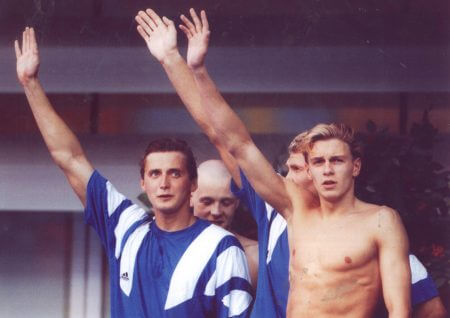
Pyshnenko (back right) on the podium at the 92 Barcelona Games. Photo Courtesy: International Swimming Hall of Fame (ISHOF)
Nearly two decades later, Gustavo Borges and Vladimir Pyshnenko have kids on the swim team at the University of Michigan. Both of them swim the same events. Both swim in the same training group. And they are both in the same class.
“It’s pretty funny,” said Daria Pyshnenko while on her training camp in Miami. “Our dads are good friends. So when I committed, Gus committed a few weeks before and my dad saw that and he was like ‘oh, I know his dad’ and I was like ‘what do you mean?’ and he said ‘he is one of my good friends.’
“They still talk to this day like whenever they visit, they see each other. They were pretty close during the Olympics. I guess a lot of people were close, like everyone knew everyone. It’s kind of funny like our dads swam together and now we are swimming together.”
Borges and Pyshnenko committed to Michigan in the fall of 2016, nearly two full decades after both of their dads raced each other in the Atlanta Olympics. Pyshnenko’s mom, Natalya Mescheryakova*, also swam in two Olympics, reaching the final in the 50 free in 1992 and 1996.
Both Pyshnenko and Mescheryakova served suspensions for positive doping tests*.
“When I met her before school started, my dad told me that her dad swam against him,” Gus Borges said. “I meet with Vlad when he comes to Michigan and it’s really cool to have him be around the team, and it is great for the culture even though he didn’t swim at Michigan.”
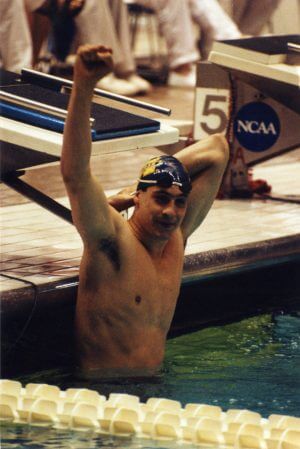
Gustavo Borges at the 95 NCAAs. Photo Courtesy: International Swimming Hall of Fame
Gus Borges is following in the footsteps of his father, who swam for Michigan from 1992 – 1995 and was a 10-time NCAA champion. He also won four Olympic medals and was inducted into the International Swimming Hall of Fame, which Gus said he felt pressure growing up trying to live up to the legacy of his father. From age 12 – 15 he had started to realize how good his dad had been and was comparing himself to him. But as he got older he was able to train his mind to not think that way.
“As I got older it got easier. I actually started beating his times and it took a lot of pressure off of myself because I stopped thinking that I have to be like him,” Borges said.
Pyshnenko had similar feelings about trying to live up to what her parents did.
“Whenever people found out my parents swam in the Olympics, they would ask when I was going to go,” she said. “So that’s why when I was little I didn’t really enjoy swimming that much because I wasn’t the fastest growing up so people would be like ‘who is that? Oh, THAT is the Olympian’s daughter.’ And I was like barely staying above water and not taking it seriously.”
But like Borges, Pyshnenko had a change of heart about the sport when she was 13.
“I started getting faster and starting to enjoy the sport more and I think that’s when the pressure kind of come off because I was doing it for me and not doing it for my parents,” she said. “It’s not their choice that I’m swimming; at this point it is mine that I want to keep swimming. I think the pressure is finally gone. I don’t really talk to them about swimming because they’re still coaching.”
Vlad and his wife Natalya came to the United States so their daughter could become a US citizen. They had a family friend that lived in Illinois that they could crash with for a brief period and the family has stayed in that area ever since, currently coaching at CATS Aquatic Team in Illinois. Vlad lives close to Ann Arbor but is not able to go to many Michigan duel meets because he has a busy meet schedule of his own.
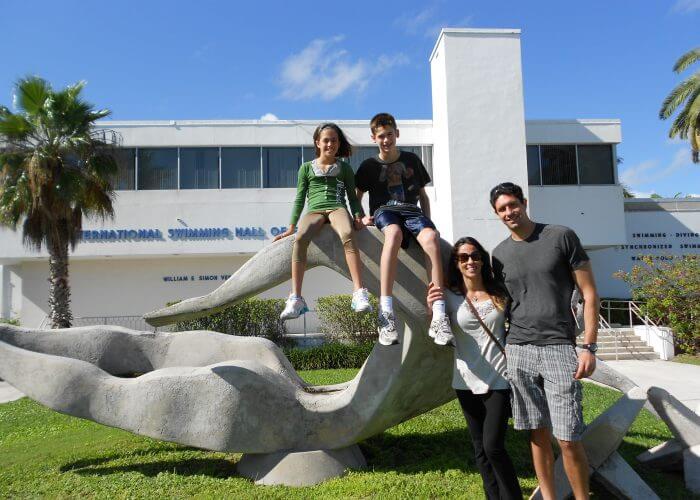
Gustavo Borges with his wife and two kids during his induction into the International Swimming Hall of Fame in 2012. Photo Courtesy: International Swimming Hall of Fame
Gustavo lives in Brazil now but has been able to come back to Ann Arbor on a couple of occasions to visit his old college town, see his son swim, and catch up with the coaching staff and his good friend Mike Bottom. Gustavo, who had a great career at Michigan, did not want to influence his son’s decision on where he would go to school. But when he went on his visits, it was Michigan that stood out to Gus the most.
“Everything felt right,” Gus Borges said. “The team and the culture was what stood out to me the most.”
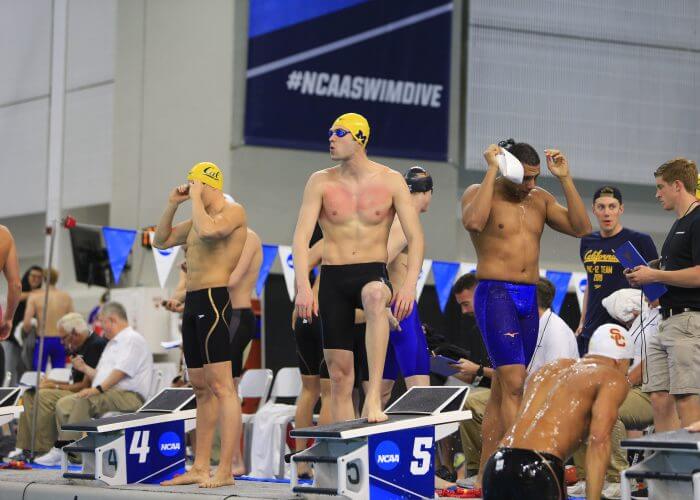
Gus Borges at the 2019 NCAAs. Photo Courtesy: Walt Middleton
Borges and Pyshnenko train together nearly every single day in the sprint group. Pyshnenko is one of the only girls that swims full-time with the sprint group so she lines up alongside the guys all the time in practice. She says Gus is the most positive one in the group all the time.
“He keeps everyone going and he is very uplifting. Even in the morning at 6 a.m. he will be like “good morning, everyone!” and we are like “how do you have this much energy?” But it’s refreshing because everyone is so groggy and he is always awake and ready to race and have fun.
“It’s very hard to stay positive during a hard set when everyone is dying and breathing hard and he is just saying, ‘Go Blue!’ or ‘you got this!’ just cheering everyone on even if you’re last in the lane he would be like “good job, you can do it!”
According to Gus Borges, Daria’s best attribute is her work ethic and her competitiveness.
“She has surprised people at times. She can rip a threshold workout and she always throws down with the guys.
“She is a really solid racer and a clutch swimmer. She is always there to swim fast no matter what. At one point this season she was sick and then did well at the next meet. She can step it up when it counts.”
Last year at NCAAs, Pyshnenko anchored both of Michigan’s sprint free relays to second place finishes. In her own words, she said it was a bit stressful, but she stepped up to the occasion, splitting a 21.65 on the end of the 200 free relay and a 47.68 on the end of the 400 free relay. Those swims were nearly a second faster than anything she did from a flat start last season, proving she could step up when it counted. She said she feeds off of the intense atmosphere that meets like NCAAs and Big Ten’s bring.
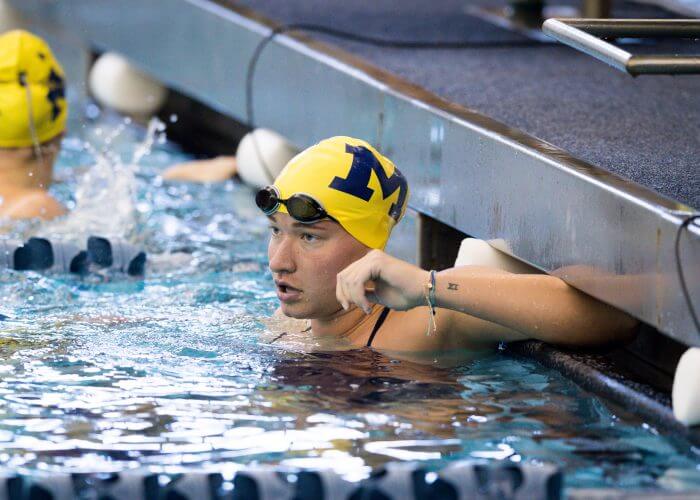
Daria Pyshnenko. Photo Courtesy: Daryl Marshke
And Daria did also get ill this year like Borges mentioned, suffering from mononucleosis earlier in the fall. She was out of the water for a couple weeks and missed training, but was able to get back into shape quickly before the Minnesota Invite, where Michigan lined up against two of the best teams in the nation in Cal and Texas as well as Big Ten rivals Minnesota and Iowa.
At the meet, Pyshnenko swam best times in the 50 (22.19) and 100 free (48.12) and 100 fly (54.19), which was completely unexpected because of what her health had been.
“I feel like I didn’t have any expectations because I got sick and I’m not going to do well. I was swimming and I was like ‘you know what? Why not go all out and see what I can do at this point?'” she said.
Michigan wound up second on the men’s and women’s side at Minnesota, with the men taking down the reigning NCAA champions Cal.
“The meet was so fast, it was insane,” Gus said. “It really gave our non-NCAA guys a taste of how fast the country really is and I think it opened their eyes to the work we all need to put in to be the best.”
Borges was fourth in the 50 free (19.40), seventh in the 100 (43.04) and eighth in the 200 (1:35.52) in Minnesota. The 200 free in the morning was a lifetime best time but his main sprint events were off his best. After a breakout Georgia Invite a year ago, he didn’t swim as well at Big Ten’s and NCAAs in the postseason. So this year he wanted to save his best for those meets and did not want to peak too early. Although his Minnesota Invite was not the best in terms of the times he threw down, he thought it was a success because of what he learned during the meet, including learning how to control his emotions in a long and intense competition.
“I am going to be on a lot of relays at Big Ten’s and NCAAs so I have to keep my emotions in check and stay in the meet on the last day.
“Last year at NCAAs, we swam faster on the last day and got faster as the meet went on. We realized swimming is very mental because we had this victim mentality that we didn’t hit our tapers because we didn’t swim that well the first half of the meet.
“Your feeling in the water is sometimes not super accurate. That was a big learning moment for us.”
Last year, the Michigan men were 13th at NCAAs, after coming into the meet predicted to finish sixth.
This year, the Michigan men have had a shift in their attitude, changing little things in and out of the pool to ensure they are at their best. Michigan hasn’t won a Big Ten team title since 2016 with rival Indiana winning three straight. The Wolverines have since beaten the Hoosiers in a duel meet, but it is still anyone’s game come Big Ten’s.
It’s a sentiment the Michigan women share, who had their winning streak snapped by Indiana at Big Ten’s last year as well.
“We did lose a couple seniors that were a big part of the team and got a lot of points but being a part of that atmosphere, everyone wants to win this year so everyone is working together really hard,” Pyshnenko said. “We are swimming for us but also for the teams beforehand. We want to make all the alumni proud. All the other swimmers that won Big Ten’s are still watching down at us and want us to win so it’s fun to do that.”
One of the alumni that will definitely be watching to see how Michigan does this year is Gustavo Borges. His son Gus will also have a chance to qualify for Brazil’s Olympic team this summer and have a chance to be a second generation Olympian. Second generation Olympians are not uncommon, but it seems rather uncommon that Olympians’ kids would be future teammates at the same school swimming the same events and be in the same graduating class. But Borges and Pyshnenko are making those one in a million odds a reality.
Gus Borges and Daria Pyshnenko continue to motivate each other every day in the pool as the two juniors push for team titles at Michigan. And carry on the legacies that their parents started.
* – Vladimir Pyshnenko, a member of the Russian 4x200m relay team that set a world record in the 1992 Olympics in Barcelona, was one of three Russian swimmers who tested positive for steroids at a training camp in Cyprus in October 1997. The other two swimmers were sprinter Natalya Mescheryakova, then European champion in the 50m free, and Olga Kochetkova, a backstroke specialist. They were all barred from the 1998 World Championships in Perth.




.jpg)
